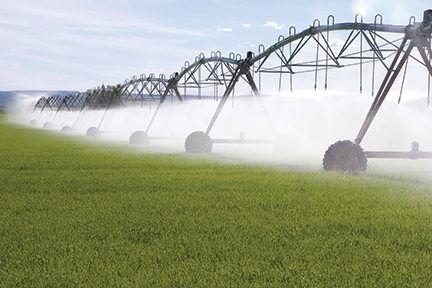Current Temperature
28.5°C
Future of irrigation discussed at Jan. conference
Posted on February 27, 2023 by Taber Times
By Al Beeber
Southern Alberta Newspapers
Extreme weather conditions are impacting agriculture and a conference in late January allowed those involved in the industry to hear and exchange information about the future of irrigation.
The Irrigated Crop Production Update conference was staged at the Sandman Signature Lethbridge Lodge.
Organized by Lethbridge College, the one-day conference provided members of the agriculture industry to learn about the present state of irrigation and its future.
Various sessions were conducted throughout the day with focuses on irrigation research projects and initiatives, pest management, modernization and expansion of irrigation and other topics as well as updates on snowpack and reservoir conditions, irrigation infrastructure and water delivery.
Stefan Kienzle, professor of Geography Arts and Science at the University of Lethbridge, said Thursday during a break that the extremes of heat and cold as well as days of crop stress are increasing and all are having an impact on agriculture.
Climate change has four key aspects that impact agriculture including “too hot, too cold, too wet, too dry. And we are all impacted by those four changes,” said Kienzle.
“We all have experienced those tremendous heat waves and heat domes and the number of heat waves is actually increasing in our growing season by the factor of two to four,” Kienzle said. That means as many as four times as many days with warmer than normal temperatures.
The number of days of crop stress, the professor said, which are generally days of temperatures over 30C, are “increasing tremendously.”
Cold spells are also doubling in numbers which means there is a much larger swing of extreme weather from hot and dry to cool, cold and maybe wet, the professor added.
Kienzle said 2.5 years ago in September, there were between one and two feet of snow which had a huge impact on harvest. In 2022, there was a cold spring which delayed seeding.
“Those are direct impacts we’ve already experienced.”
Those will become the new normal and producers have to be ready, he said.
“Irrigation is the No. 1 technology to help us against the droughts and the problem that we’re facing is a multi-year drought when the snowpack just doesn’t grow as much as we want a few years in a row.”
When that happens and reservoirs aren’t filling enough, then irrigators have to reduce irrigation which impacts their yields.
“That is the biggest threat that irrigators are facing today other than the wild weather swings” which he says there is little to do about.
Kienzle projects an increasing number of hot and cold spells in the future with heat waves and heat domes becoming more regular. There will be more floods, more days over 30 “and unfortunately, and really most scary, we’ll have more and longer droughts,” said Kienzle.
Richard Phillips, general manager of the Bow River District and chair of Irrigating Alberta, Inc., said the number of acres irrigated in Alberta has doubled since the 1970s but irrigators are using less water.
Phillips gave the conference an update on the Alberta irrigation modernization program and its process. This was new funding announced by the Alberta government a couple of years ago with the Canada Infrastructure Bank and the province investing money into irrigation, the purpose being to modernize it.
Of about 90 projects, about a third are completed and a third are under construction. Most of them involve pipelines replacing canals while some are structural and others canal upgrades. There are four reservoir projects planned, as well.
Phillips said “pipelines are incredibly important to districts. We’ve seen huge improvements in efficiency over the past few decades, largely attributable to two things – pipelines for our infrastructure and conversion on farm irrigation from inefficient methods to highly efficient centre pivots. But pipelines have played a huge role in reducing water use in the districts and these pipelines under this project will do the same so we expect to save a lot more water as we complete these pipelines.”
Willemijn Appels, senior Applied Research Chair in Irrigation Science at the college and one of the organizers, said the conference – being staged by LC for the first time – was an opportunity to get producers all in one room.
“It’s fantastic,” she said of the turnout at the conference which was the first since 2020.
“It’s one of the main events where you get specifically the irrigated producers, people who have a variety of crops but all use water to grow them, in one room.
“There’s a lot of excitement because of the developments in infrastructure organization,” she said.
Irrigation farmers “are often a little bit in the forefront of doing new things.”
Leave a Reply
You must be logged in to post a comment.

